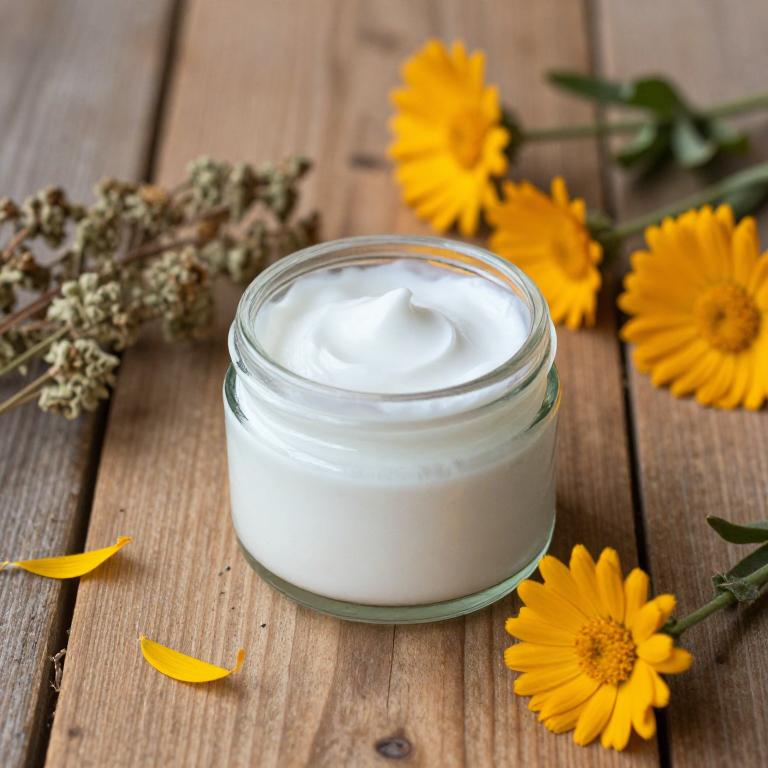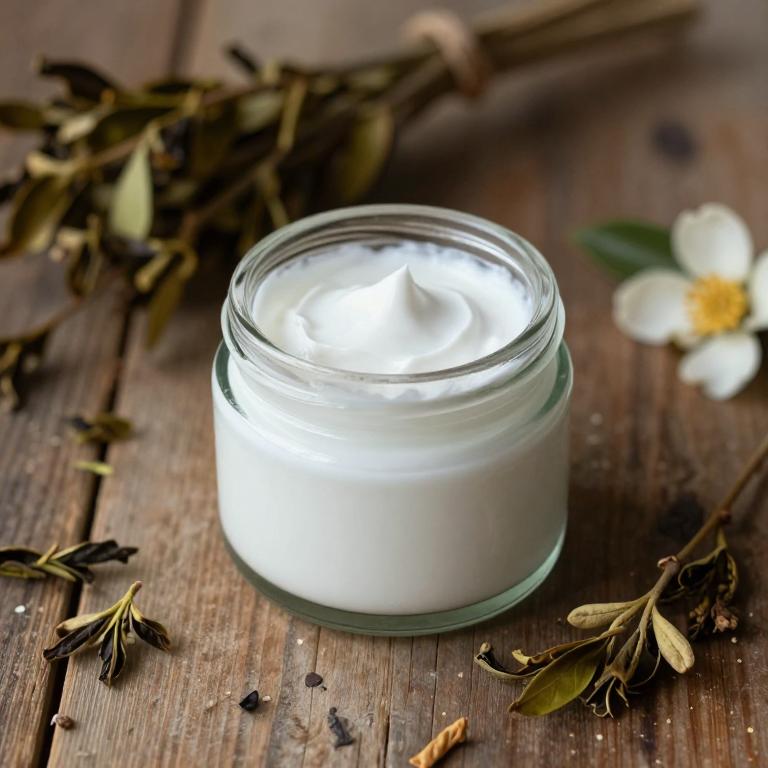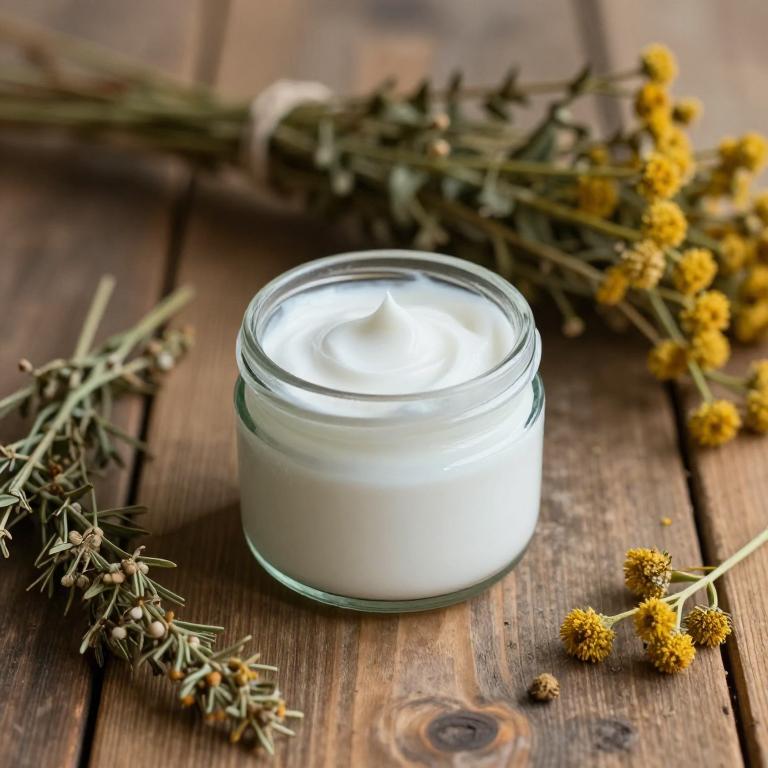10 Best Herbal Creams For Fever Blister On Lip

Herbal creams for fever blisters on the lips are natural remedies that may help soothe the discomfort and promote healing.
These creams often contain ingredients like calendula, chamomile, or tea tree oil, which have anti-inflammatory and antiviral properties. They can help reduce redness, swelling, and the pain associated with cold sores. While they may not cure the infection, they can provide relief and support the body's natural healing process.
It is important to consult a healthcare provider if the blisters persist or worsen, as more severe cases may require prescription treatment.
Table of Contents
- 1. St. john's wort (Hypericum perforatum)
- 2. Marigold (Calendula officinalis)
- 3. English lavender (Lavandula angustifolia)
- 4. Echinacea (Echinacea purpurea)
- 5. Ginger (Zingiber officinale)
- 6. Camellia (Camellia sinensis)
- 7. Yarrow (Achillea millefolium)
- 8. Dog rose (Rosa canina)
- 9. Lemon balm (Melissa officinalis)
- 10. Aloe vera (Aloe barbadensis)
1. St. john's wort (Hypericum perforatum)

Hypericum perforatum, commonly known as St. John's Wort, is a herbal remedy that has been traditionally used for its anti-inflammatory and antiviral properties.
When formulated into a topical cream, it may help alleviate symptoms associated with fever blisters on the lips by reducing inflammation and promoting healing. However, it is important to note that while some studies suggest potential benefits, the effectiveness of St. John's Wort cream for cold sores is not universally proven, and results may vary among individuals. The cream is generally considered safe for topical use, but it may interact with certain medications, so consultation with a healthcare provider is advisable before use.
Additionally, it should not be used as a substitute for prescribed treatments, especially in cases of severe or recurrent outbreaks.
2. Marigold (Calendula officinalis)

Calendula officinalis, commonly known as pot marigold, is often used in herbal creams to treat fever blisters on the lips due to its anti-inflammatory and antiviral properties.
These creams typically contain a concentrated form of calendula extract, which helps to soothe the skin and promote healing. The anti-inflammatory effects of calendula can reduce redness and swelling associated with cold sores, while its antimicrobial properties may help prevent secondary infections. When applied topically, calendula-based creams can provide relief and support the body's natural healing process.
However, it is important to consult a healthcare provider before using any herbal remedies, especially if the condition persists or worsens.
3. English lavender (Lavandula angustifolia)

Lavandula angustifolia, commonly known as English lavender, is often used in herbal creams for its soothing and anti-inflammatory properties.
These creams may help reduce the pain and discomfort associated with fever blisters on the lips by promoting healing and easing inflammation. Lavender oil, a key ingredient, has natural antiviral and antimicrobial effects that may help in combating the herpes simplex virus. However, it is important to consult a healthcare professional before using lavender-based products, especially if you have sensitive skin or an allergic reaction to any of its components.
While herbal creams can offer some relief, they should not replace medical treatment for persistent or severe outbreaks.
4. Echinacea (Echinacea purpurea)

Echinacea purpurea, commonly known as purple coneflower, is often used in herbal remedies for its potential anti-inflammatory and immune-boosting properties.
When formulated into creams, echinacea can be applied topically to fever blisters on the lips to help reduce inflammation and promote healing. These creams may contain other soothing ingredients like aloe vera or chamomile to enhance their effectiveness. While some studies suggest echinacea may support the body's immune response, its direct efficacy for cold sores is still under investigation.
As with any topical treatment, it is advisable to consult a healthcare professional before use, especially if there are underlying skin conditions or allergies.
5. Ginger (Zingiber officinale)

Zingiber officinale, commonly known as ginger, has been traditionally used for its anti-inflammatory and antiviral properties, making it a popular ingredient in herbal creams for treating fever blisters on the lips.
These creams often contain essential oils and extracts from fresh or dried ginger root, which may help reduce swelling, soothe pain, and promote healing of the affected area. While some studies suggest that ginger may inhibit the growth of certain viruses, more research is needed to confirm its effectiveness specifically for cold sores. Herbal creams with ginger are generally considered safe for topical use, though they may cause mild irritation in some individuals.
As with any treatment, it is advisable to consult a healthcare professional before using ginger-based products, especially if the fever blisters are severe or persistent.
6. Camellia (Camellia sinensis)

Camellia sinensis, commonly known as the tea plant, is the source of various herbal formulations that have been explored for their potential in treating fever blisters on the lips.
While not a direct cure, some herbal creams containing Camellia sinensis extracts may offer soothing and anti-inflammatory benefits due to their antioxidant and antimicrobial properties. These creams are often used as complementary treatments alongside conventional antiviral medications to alleviate symptoms and promote healing. However, it is important to consult a healthcare professional before using any herbal remedy, as individual responses can vary.
Overall, Camellia sinensis-based creams may provide some relief but should not replace medical advice or treatment for fever blisters.
7. Yarrow (Achillea millefolium)

Achillea millefolium, commonly known as yarrow, is a herb often used in natural remedies for its anti-inflammatory and antiseptic properties.
When formulated into a cream, it can be applied to fever blisters on the lips to help reduce inflammation and soothe the affected area. The active compounds in yarrow, such as essential oils and flavonoids, may help to speed up the healing process and prevent secondary infections. However, it is important to consult a healthcare provider before using any herbal cream, especially if you have sensitive skin or are taking other medications.
While some people find relief with yarrow-based creams, they should not replace conventional treatments for severe or persistent cold sores.
8. Dog rose (Rosa canina)

Rosa canina, also known as dog rose, is a herbal remedy that has been traditionally used for its anti-inflammatory and antiviral properties.
Rosa canina herbal creams are often formulated with extracts from the fruit and flowers of the plant, which may help reduce the symptoms of fever blisters on the lips. These creams can provide soothing relief by promoting healing and reducing redness and swelling associated with cold sores. Due to their natural ingredients, they are generally considered safe for topical use, though individuals with sensitive skin should perform a patch test first.
While they may not cure fever blisters, they can support the body's natural healing process and alleviate discomfort.
9. Lemon balm (Melissa officinalis)

Melissa officinalis, commonly known as lemon balm, is a herbal remedy often used in the form of creams to treat fever blisters on the lips.
These creams are typically made by extracting the essential oils and active compounds from the leaves of the plant, which have antiviral and anti-inflammatory properties. Lemon balm cream can help soothe the pain and reduce the duration of cold sores caused by the herpes simplex virus. It is generally considered safe for topical use, though it is important to patch test before applying to a larger area.
Many people find it to be a gentle and natural alternative to conventional treatments for fever blisters.
10. Aloe vera (Aloe barbadensis)

Aloe barbadensis, commonly known as aloe vera, is often used in herbal creams to help alleviate symptoms of fever blisters on the lips.
These creams contain aloe vera gel, which has natural anti-inflammatory and antiseptic properties that can soothe the irritated skin and reduce the risk of infection. Applying aloe-based cream to the affected area can help speed up the healing process and provide a cooling effect, which may ease discomfort. However, it is important to note that while aloe vera may offer some relief, it is not a cure for cold sores and should not replace medical treatment if symptoms persist or worsen.
Always consult a healthcare professional for severe or recurring cases of fever blisters.